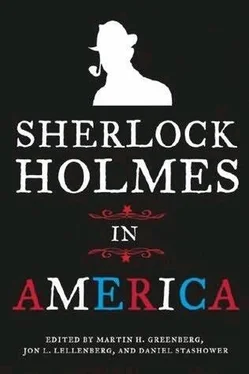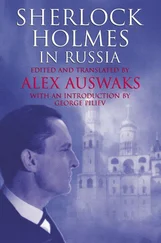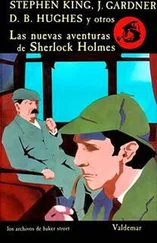“This is all conjecture,” Mrs. Penny exclaimed, her face now crimson with outrage. “I refuse to believe a word of it.”
But Mr. Penny had calmed down a bit, and he was studying Holmes with a contemplative frown. “I believe, Mr. Holmes, that you have concocted this wild tale with the best of intentions, to reassure Mrs. Penny and myself that our daughter is safe on the other side of the country when you really believe her to be a fallen woman held captive someplace where we will never find her. If this is the case, I assure you, we are strong enough to hear the truth, whatever it may be.”
Mrs. Penny’s cry of anguish proved she wasn’t as strong as her husband claimed, but Holmes ignored her. He reached into his coat pocket and pulled out the telegram he had received earlier today. “I took the liberty of telephoning Princeton Seminary yesterday. They were kind enough to give me Mr. Etheridge’s direction in San Francisco, and I sent him a telegram informing him that Miss Penny’s disappearance had caused a sensation in New York. He was completely ignorant of this unfortunate development. Most probably he and Miss Penny felt certain no one but her parents would even notice she was gone. Under the circumstances, they wish you to know that your daughter and Mr. Etheridge were married three days ago in San Francisco. I believe congratulations are in order.”
Holmes held out the telegram, and Malloy snatched it from him before the Reverend Mr. Penny could gather his wits.
“It’s true,” the detective confirmed when he had scanned it.
“The ungrateful baggage,” Penny snapped. “How dare she be so selfish? Frightening her mother and me so terribly and all for her own purposes!”
“Why, she asked me only a few weeks ago what I would say if someone wanted to marry her,” Mrs. Penny recalled furiously. “I told her not to be ridiculous, that no one was going to marry her, and besides, her duty was to care for her father and me. Yet still she chose to desert us!”
“I’ve got some friends at the newspapers,” Malloy said. “I’ll give them the word. The real story will be in tomorrow’s papers, and that should calm the city down again.”
“You should also put an announcement of the marriage in the society pages,” Holmes suggested. “To at least give the illusion that you approve the match. That will go a long way to stopping the gossip.”
We left the Pennys still in shock at the treachery of the daughter they had believed to be without a mind or spirit of her own.
“Who would’ve believed Harriet Penny had so much gumption? How did you figure it out?” Malloy asked as we strolled down the tree-lined street in search of a cab. It was as close as he would come to complimenting Holmes.
“When you told me Miss Penny was as plain as an old boot,” Holmes recalled with a small smile, “I wondered why one of those young men who work for the madams… What did you call them?”
“Cadets,” Malloy supplied.
“I wondered why a cadet would select such an unattractive girl-who was already a bit old for the trade, by the way-when the city abounds with much more likely prospects. So the theory that she had been kidnapped to a brothel seemed unlikely. As I mentioned, when a young woman disappears, there is usually a man or a theater troupe involved. Since the minister’s missing daughter never attended the theater, I simply had to identify the man, no matter how unlikely a candidate he might seem.”
“She was clever,” Malloy said.
“She had to be to escape from those two,” Holmes said.
But not more clever than Sherlock Holmes.
THE CASE OF COLONEL CROCKETT’S VIOLIN by Gillian Linscott
Gillian Linscott is the author of the Nell Bray crime series, featuring a militant suffragette detective in Britain in the early years of the twentieth century. One of the series, Absent Friends , won the CWA Ellis Peters Dagger for best historical crime novel of 2000 and the Herodotus Award. She has worked as a news reporter for the Guardian and a political reporter for BBC local radio stations. She lives in a threehundred-and-fifty-year-old cottage in Herefordshire, England, and in addition to writing, now works as a professional gardener. Interests include mountain walking and trampolining.

“Admit it, Watson. Texas has not come up to your expectations.” My old friend lounged in a cane chair on our hotel balcony, the hint of a smile on his lips. Our days at sea had done wonders for his health and spirits. His face was lightly tanned, shaded by the brim of a Panama hat.
“It’s not as I’d imagined,” I agreed.
He laughed.
“You’d hoped for cowboys with lariats and six shooters, Indian chiefs in war bonnets.”
Since that was pretty well the vision that had come to my mind when the unexpected invitation arrived on a drizzly day at Baker Street, I tried to hide my irritation.
“Certainly San Antonio seems peaceable enough,” I said.
Two floors below, in the courtyard of the Menger Hotel, broad leaves of banana trees shifted gently in the breeze. Our suite, with its lounge, two bedrooms, and bathroom, was as clean and comfortable as anything you might find in London, perhaps more so. From where I was standing I could glimpse a corner of the town’s plaza, with men crossing from shade to sun and back, looking much like men of business anywhere, though moving at a leisurely pace in the heat. A neat landau, drawn by a grey pony and carrying a woman in a white dress, trotted briefly into sight and out again.
“We’ve come too late for the wild days, Watson. Seventy years ago we might have arrived in a covered wagon, pursued by as many braves or Mexicans as your warlike heart could wish. I confess my preference for the Mallory Line.”
We’d traveled in comfort down the coast from New York to Galveston on Mallory’s three-thousand-ton steamer, SS Alamo , then on by Pullman car. The letter of invitation had implored us to make all convenient speed and spare no expense-both admonitions quite wasted on Holmes, who would spend time and money exactly according to his opinion of what was necessary and nobody else’s. He stood up and joined me at the rail of our balcony, looking down at the courtyard. A gentleman in a white suit and hat had appeared from the reception area and was walking towards the foot of our staircase. Holmes gave a chuckle of satisfaction.
“Unless I am mistaken, Watson, here comes our client now.”
Benjamin Austin Barratt was a gentleman of fifty years or so, still vigorous, straight-backed, and broad-shouldered, with thick dark hair and a small moustache on an otherwise clean-shaven face. His manners were courtly, asking after our health and our journey, as if his only purpose were to make us welcome in his native town. It was Holmes who cut short the preliminaries and brought us to business.
“You mentioned in your letter that you were writing on behalf of the Daughters of the Republic of Texas. Do we take it that you are their representative?”
“Indeed so, sir. You will surely be aware that before Texas became part of the United States of America it was an independent republic in its own right by virtue of-”
“We are aware of it, yes.”
Holmes spoke with some impatience. Almost everybody we’d met, from our fellow passengers on the voyage down, to the lad who’d carried our cases to our rooms on arrival, had offered this fact as soon as setting eyes on us. Barratt showed no annoyance and went on with his explanation.
“The ladies thought it preferable that you should be approached by a businessman with some standing in our community. Since I have the honour to be one of the benefactors of their Alamo project and have an interest in the matter under discussion, it was agreed that I should write to you. You will have gathered something of our dilemma from my letter.”
Читать дальше













